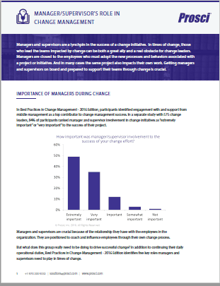Prosci's 2018 Best Practices research reports that 86% of respondents expected change to increase slightly or significantly in the next two years after the research was completed. None of those respondents could have predicted the huge transformation many were expected to move through in March and April of this year. Whilst the transition into lockdown was fairly clear and easily defined, our move back into office working and interacting with customers and colleagues is less so. Organisations are navigating a variety of complex issues, such as the financial implications of bringing employees back into office environments, the benefits of (supposed) increased productivity from home working and managing the implications of a Coronavirus cluster in the office. Alongside organisational issues, each individual will have their own personal concerns and point of view that will shape their feelings about returning to the office environment.
During the unpredictability of the last few months, one group has been key to supporting employees to adapt to the new working environment - line managers. They will also play a vital role in the continuing transformation of our working practices, whether that means returning to office environment or embedding the skills of home working.
Line managers hold a crucial role during times of change, often we even go so far as to refer to line managers as our change managers. They hold the relationships with those we require to change and, can influence their support or resistance to that change. In fact, being able to effectively engage employees is one of the greatest contributors to the success of a change.
As a result, Prosci has developed 5 roles for managers to fulfil during times of change. These roles are defined under 5 headings: Communicator, Liaison, Advocate, Resistance Manager and Coach. Managers communicate with their teams about changes, advocating for the new way of working, and acting as a liaison between the project team and their own direct reports. As a resistance manager and a coach, managers support their employees through their own personal change journeys. Combined, these roles are not far from what we expect managers to do in their day job, however, explicitly calling them out and supporting managers to fulfil these roles can hugely benefit the success of a change.
For managers, the two roles highlighted in Prosci's Best Practices as the most challenging are being a resistance manager and a coach. Both of these roles often require managers to have uncomfortable and difficult conversations with their teams. To support those difficult conversations managers can use another of Prosci's models: ADKAR. ADKAR is Prosci's individual model for change and is formed of 5 building blocks: Awareness, Desire, Knowledge, Ability and Reinforcement.
Download: Manager/Supervisor's Role in Change Management
ADKAR provides a framework for managers to understand where an employee is on their change journey. It helps to focus the conversation on the employee's barriers to change and helps the manager avoid sending the wrong messages or spending time on the wrong topics. By actively listening to the objections of an employee, managers can identify the barrier point for that individual and tease out their real concerns about the new way of working.
Finally, managers are in fact, preferred senders of messages about the personal reasons for employees to engage in a change. As we further adapt to our working environment, we will continue to see personal decisions shaping each employee's response to their organisation's direction. Ensuring managers are equipped to support their teams through these new adaptations will increase the likelihood of the success of those changes.
During our 1 day workshop Prosci® Leading your Team Through Change Workshop managers can learn about the 5 roles they need to fulfil during times of change and how to apply the Prosci ADKAR® Model to facilitate individual change and mitigate employee resistance.
At CMC Global, we offer both virtual and face-to-face Prosci change management training privately for organisations. If you're interested in Prosci change management training for your managers, get in touch!



